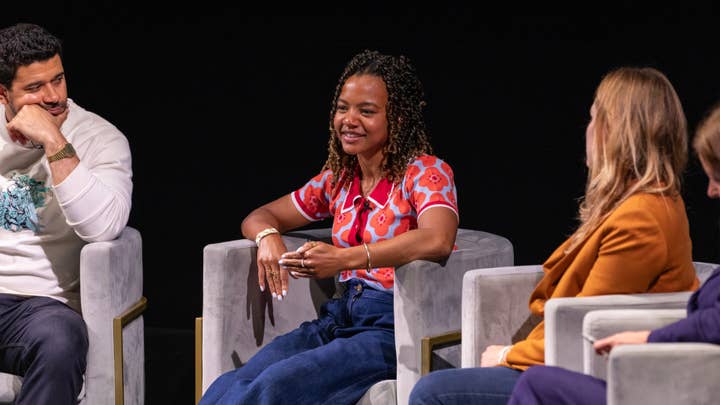Providing support for performance actors during game development
The BAFTA Games Mental Health Summit recently gathered actors to discuss improvements needed in the gaming industry to enhance performers' mental health.
Moderated by Kate Saxon, an expert in performance capture and voice directing, the panel included Doug Cockle (The Witcher), Alix Wilton Regan (Assassin's Creed Origins), Jessica Hayles (Dead Island 2), and Robert Gilbert (Ghost Recon Breakpoint).
The dialogue centered on establishing safe working environments, supporting the acting process, and ensuring performers feel involved from auditions to the release of a game.
Creating a Safe Work Environment
Ensuring a secure and congenial workspace is crucial, whether in the voice booth or during performance capture.
"Basic rights shouldn't need to be requested, such as breaks for personal necessities," Hayles stated, listing examples like toilet and prayer breaks and providing private spaces.
Gilbert emphasized the importance of actors knowing why certain individuals are present during recording sessions to reduce anxiety.
"Proper introductions and explanations of roles are essential," Gilbert stated. Cockle added that unknown attendees, particularly high-ranking officials, can distract actors.
"Keep the number of people in sessions to the minimum necessary," Cockle advised. "Too many conflicting inputs from various parties can hinder an actor’s performance and prevent them from feeling vulnerable or playful."
Handling Sensitive Subjects
Saxon proposed that developers provide actors and directors with a briefing document during casting to outline sensitive content expected in the game.
"[It's important for] creatives coming on board to have agency about playing a character that may have some challenging things to play"Kate Saxon
Hayles agreed, suggesting that preparation and awareness of sensitive material help actors deliver their best performances.
Drawing from her work on Mafia 3, Saxon described measures taken to protect actors during scenes involving racism. These included rehearsals, small developer teams, and allowing actors to halt if they felt uncomfortable.
Hayles and Gilbert stressed the importance of having researchers handle sensitive content rather than expecting actors to do so, particularly those who've experienced such issues firsthand.
Regan highlighted the need for actors to be forewarned of intimate scenes and suggested intimacy coordinators, especially in performance capture settings.
"If Assassin’s Creed Origins were produced now, an intimacy coordinator would be a must," she said.

Maintaining Clear Communication
Keeping actors informed from auditions through casting is vital for their mental wellbeing.
Cockle mentioned that actors often aren’t notified if they haven't been selected, leading to uncertainty and stress.
He shared an experience from The Witcher series, where he learned from a friend rather than the developer that CD Projekt Red was recasting his character. This initially led him to doubt his skills until he audited again and secured the role.
"Sometimes, hearing 'no' can be overwhelming," he mentioned. "It’s not just about the first audition; for me, it was about regrouping and questioning, 'Am I worthy? Do I believe in my potential?'
"Have confidence in yourself. If you think you have what it takes, try again. The worst outcome is just another 'no,' nothing more."
Clear communication is crucial for everyone involved, from developers to agents to actors, ensuring everyone understands why decisions are being made. This includes situations where a role is recast with the actor's prior knowledge.
"It's about managing expectations so the impact isn't as harsh," Cockle noted.
Ways to Engage Actors During Development
Signing an NDA is standard in the industry, but the discussion highlighted the negative impact it can have during performance, particularly when actors struggle to connect with their character or are uncertain of what they can disclose during development.
"I would genuinely prefer developers to trust us enough to inform us if we’re working on a new Assassin's Creed or Mass Effect, as that sets the tone and atmosphere," Regan expressed.
Regan continued, explaining that her current project is so heavily redacted and codenamed that it's challenging to understand the storyline or characters.
"Developers must trust that we have no interest in breaking our NDA – leaking information doesn’t benefit us," she added. "The more they trust and involve us, the better we can perform."
Gilbert concurred: "While I get that some game details can’t be shared, providing as much relevant reference material as possible is incredibly beneficial."
"When it comes to character work, specificity is key. It's not just about vocal tone or appearance but understanding the character's role in the story. What's their objective? What are they striving to achieve?"
Cockle shared that his frustration lies in not knowing what to say and when.
"We're often kept in the dark, yet we could help generate buzz for your game if you involve us more."Doug Cockle
He cited his recent experience with Remedy on Alan Wake 2 as a positive example, where he felt included throughout the process despite the NDA.
"The marketing team kept us informed at every stage, from development updates to specific timelines for what we could share," he said. "We were given clear talking points, which allowed us to be actively involved in the publicity and marketing efforts."
He added: "If you include us as part of your team, we can help you build excitement around the game."
Regan also shared her experience with The Elder Scrolls Online: Gold Road, where the cast received materials to post simultaneously, ensuring they stayed "on brand."
"It's about inclusion, empowerment, and making us feel like we're part of the family and the team," she emphasized.
